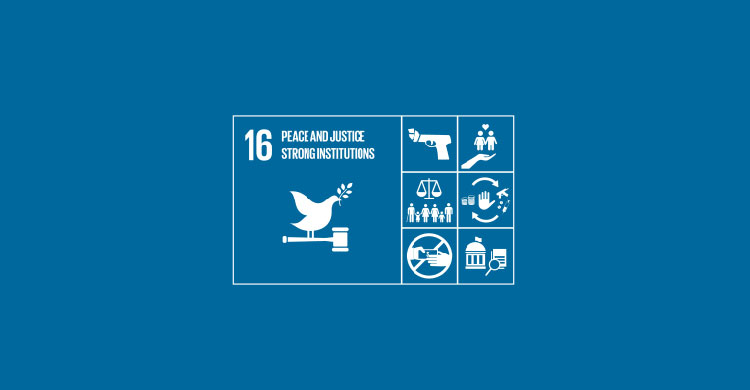Peace, Justice & Strong Institutions: Challenges for Bangladesh

Tariq Monawer: In September of 2015, when SDG was adopted in UNDP, policy-makers around the globe praised the initiative specially, for the bold move of including the word ‘Sustainable’ in it. 17 goals, targets of which contain the word ‘Sustainable’ more often than required (that’s what the critics thought) were taken as a challenge by the signatories for next 15 years (2015-30) and Bangladesh was one of the signatories of that resolution. One of those SDGs is goal no.16 or SDG16 which in short refers to “Peace, Justice & Strong Institutions”.
The aim of SDG16 is to promote the rule of law at national and international level and ensure access to justice for all, reduce illicit financial and arm flows, strengthen the recovery and return of stolen assets and combat all form of organized crime.SDG16 contains 12 targets and 24 indicators. There are lots of overlapping and redundant among the targets of SDG16. However, there are some important targets of SDG16 and attaining of those needs to be the prior aim of the government for policy making.
The first one is reducing all form of violence. Violence is one of those common words in Bangladesh which we end up reading in everyday’s newspaper or watching in everyday’s news-channel and around us. Violence is one of the biggest concern which is increasing in multi-dimensional way in Bangladesh in recent times. Political, religious, domestic, physical, sexual violence are the examples of those. Distinct surveys show the number of world population who have faced violence in last 15 years, almost half of those were political violence. No wonder, developing countries like Bangladesh are the worst sufferer where political consensus is one of the rarest.
The second one is ending all form of abuse, trafficking, exploitation and torture against children. News of child abuse in daily basis shows us the increasing of torture and abuse against children in Bangladesh. Students being sexually abused by their teachers, being brutally tortured by their teacher are the recent examples of child abuse in Bangladesh. Recently, there was a good initiative taken by the government proposing to enact law banning all kind of torture and psychological torture towards students but the abuse and torture in their house remain out of the law.
The third one is reducing corruption and bribery substantially in all their forms. During the last annual review of SDG at High Level Political Forum (HLPF), they found out that the police and the judiciary being corrupted is one of the biggest barriers attaining SDG16 among developing countries. In Bangladesh, we find no difference with all those detention and extra-judicial killings.
The fourth one is reducing illicit financial and arms flows significantly by 2030. Review from HLPF shows that the tax evasion rate in developing countries is $1.26 trillion (per year combined)which could use to lift up the people who are living below $1.25 per day for atleast six months. The number shows us that how big is the illicit financial flows in developing countries. In Bangladesh, the tax collection procedure is a bit complicated for general people even though the government arranges tax-week every year. Most of the tax payers of this country are regular employees of government and non-government companies while the businessman, landlords and independent workers remain out of proper taxation.
The fifth one is ensuring public access to information and protecting fundamental freedoms. Bangladesh has law regarding right to information (Right to Information Act, 2009) which ensures access to information even though the effectiveness of this law is not significant. On the other hand, there is Digital Security Act, 2018 which actually hinders the paths of protecting fundamental freedoms in multi-dimensional way.
The sixth, last and most important one is developing effective, accountable and transparent institutions at all levels. Accountability and transparency make institution strong and effective and which always help the development of a country.
As there are strong association between peace and development, effective institutions are but helpful to the country while attaining SDG16. Developing effective institutions doesn’t only mean the institutions of government, but also the political parties, commissions, educational institutions. Because, there is no way we can make the former institutions effective, transparent and accountable without making the latter institutions effective, transparent and accountable.
The practice of transparency and accountability needs to start from the core as they make an institution effective and without those we can’t hope for strong institutions. Strong institutions will lead us to justice and justice will surely lead us to peace. Consequently, we could create a more stable society and effective governance.
MD. Tariq Monawer: Student; Department of law, University of Chittagong

